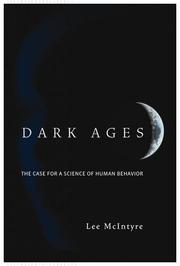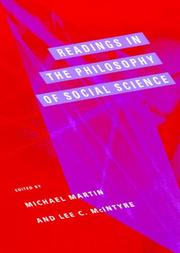| Listing 1 - 10 of 19 | << page >> |
Sort by
|
Book
ISBN: 0813328284 Year: 1996 Publisher: Boulder, CO ; Oxford Westview Press
Abstract | Keywords | Export | Availability | Bookmark
 Loading...
Loading...Choose an application
- Reference Manager
- EndNote
- RefWorks (Direct export to RefWorks)
Filosofie en sociale wetenschappen --- Philosophie et sciences sociales --- Philosophy and psychology --- Philosophy and social sciences --- Psychologie en filosofie --- Psychologie et philosophie --- Psychology and philosophy --- Social sciences --- Sciences sociales --- Philosophy --- Philosophie

ISBN: 1282097989 9786612097980 0262279517 1429416157 9780262279512 9781282097988 0262134691 9780262134699 9780262512541 0262512548 6612097981 9781429416153 Year: 2006 Publisher: Cambridge, Mass. MIT
Abstract | Keywords | Export | Availability | Bookmark
 Loading...
Loading...Choose an application
- Reference Manager
- EndNote
- RefWorks (Direct export to RefWorks)
Why the prejudice against adopting a scientific attitude in the social sciences is creating a new "Dark Ages" and preventing us from solving the perennial problems of crime, war, and poverty.
SOCIAL SCIENCE --- Sociology / General --- Social sciences --- Social Sciences --- Social Sciences - General --- Social sciences. --- Behavioral sciences --- Human sciences --- Sciences, Social --- Social science --- Social studies --- Civilization --- PHILOSOPHY/General --- Philosophy and psychology of culture --- Sciences sociales

ISBN: 0262631512 0262132966 9780262631518 Year: 1994 Publisher: Cambridge (Mass.): MIT press
Abstract | Keywords | Export | Availability | Bookmark
 Loading...
Loading...Choose an application
- Reference Manager
- EndNote
- RefWorks (Direct export to RefWorks)
Social sciences --- Philosophy. --- 3:165 --- Grondslagen van de sociale wetenschappen. Epistemologie van de sociale wetenschappen --- 3:165 Grondslagen van de sociale wetenschappen. Epistemologie van de sociale wetenschappen --- 303 --- 316.2 --- 303 Methoden bij sociaalwetenschappelijk onderzoek --- Methoden bij sociaalwetenschappelijk onderzoek --- 316.2 Sociologische richtingen. Sociologische scholen. Sociologen --- Sociologische richtingen. Sociologische scholen. Sociologen --- Social philosophy --- Social theory --- Philosophy --- Sciences sociales --- Philosophie --- Social sciences - Philosophy.
Book
ISBN: 9780262535045 0262535041 9780262345972 0262345978 9780262345989 0262345986 Year: 2018 Publisher: Cambridge, Mass. The MIT Press
Abstract | Keywords | Export | Availability | Bookmark
 Loading...
Loading...Choose an application
- Reference Manager
- EndNote
- RefWorks (Direct export to RefWorks)
"Are we living in a post-truth world, where "alternative facts" replace actual facts and feelings have more weight than evidence? How did we get here? In this volume in the MIT Press Essential Knowledge series, Lee McIntyre traces the development of the post-truth phenomenon from science denial through the rise of "fake news," from our psychological blind spots to the public's retreat into information silos. What, exactly, is post-truth? Is it wishful thinking, political spin, mass delusion, bold-faced lying? McIntyre analyzes recent examples--claims about inauguration crowd size, crime statistics, and the popular vote--and finds that post-truth is an assertion of ideological supremacy by which its practitioners try to compel someone to believe something regardless of the evidence. Yet post-truth didn't begin with the 2016 election; the denial of scientific facts about smoking, evolution, vaccines, and climate change offers a road map for more widespread fact denial. Add to this the wired-in cognitive biases that make us feel that our conclusions are based on good reasoning even when they are not, the decline of traditional media and the rise of social media, and the emergence of fake news as a political tool, and we have the ideal conditions for post-truth. McIntyre also argues provocatively that the right wing borrowed from postmodernism--specifically, the idea that there is no such thing as objective truth--in its attacks on science and facts. McIntyre argues that we can fight post-truth, and that the first step in fighting post-truth is to understand it"--
Philosophy and psychology of culture --- Science --- General ethics --- Truth --- Truthfulness and falsehood --- Truth. --- Truthfulness and falsehood. --- Vérité. --- Vérité et mensonge. --- Vérité. --- Vérité et mensonge.
Book
ISBN: 9780262039833 9780262352840 0262352842 9780262538930 0262538938 Year: 2019 Publisher: Cambridge, Mass. The MIT Press
Abstract | Keywords | Export | Availability | Bookmark
 Loading...
Loading...Choose an application
- Reference Manager
- EndNote
- RefWorks (Direct export to RefWorks)
Book
ISBN: 9401793646 9401793638 Year: 2015 Publisher: Dordrecht : Springer Netherlands : Imprint: Springer,
Abstract | Keywords | Export | Availability | Bookmark
 Loading...
Loading...Choose an application
- Reference Manager
- EndNote
- RefWorks (Direct export to RefWorks)
This volume follows the earlier successful book in the same series, which helped to introduce and spread the Philosophy of Chemistry to a wider audience of philosophers, historians, and science educators, as well as chemists, physicists and biologists. The introduction summarizes the way in which the field has developed in the ten years since the previous volume was conceived and introduces several new authors who did not contribute to the earlier book. The editors are well placed to assemble this book, as they are the editor in chief and deputy editors of the leading academic journal in the field, Foundations of Chemistry. The philosophy of chemistry remains a somewhat neglected field, unlike the philosophy of physics and the philosophy of biology. Why there has been little philosophical attention to the central discipline of chemistry among the three natural sciences is a theme that is explored by several of the contributors. This volume will do a great deal to redress this imbalance. Among the themes covered is the question of reduction of chemistry to physics, the reduction of biology to chemistry, whether true chemical laws exist and causality in chemistry. In addition more general questions of the nature of organic chemistry, biochemistry and chemical synthesis are examined by specialist in these areas.
Chemistry. --- History. --- Chemistry/Food Science, general. --- History of Science. --- Annals --- Auxiliary sciences of history --- Physical sciences --- Chemistry --- Philosophy.
Book
ISBN: 0262375583 0262375591 0262546302 Year: 2023 Publisher: Cambridge, Mass. : The MIT Press,
Abstract | Keywords | Export | Availability | Bookmark
 Loading...
Loading...Choose an application
- Reference Manager
- EndNote
- RefWorks (Direct export to RefWorks)
"The effort to destroy facts and make America ungovernable didn't come out of nowhere. It is the culmination of seventy years of strategic denialism. Lee McIntyre shows how the war on facts began, and how ordinary citizens can fight back against the scourge of disinformation that is now threatening the very fabric of our society. Drawing on his twenty years of experience as a scholar of science denial, McIntyre explains how autocrats wield disinformation to manipulate a populace and deny obvious realities, why the best way to combat disinformation is to disrupt its spread, and most importantly, how we can win the war on truth"-- Provided by the publisher
Book
Year: 2007 Publisher: Dordrecht: Springer,
Abstract | Keywords | Export | Availability | Bookmark
 Loading...
Loading...Choose an application
- Reference Manager
- EndNote
- RefWorks (Direct export to RefWorks)
Book
ISBN: 9781138888807 9781138888814 1138888818 113888880X Year: 2015 Publisher: New York (N.Y.): Routledge/Taylor & Francis,
Abstract | Keywords | Export | Availability | Bookmark
 Loading...
Loading...Choose an application
- Reference Manager
- EndNote
- RefWorks (Direct export to RefWorks)
Throughout history, humans have always indulged in certain irrationalities and held some fairly wrong-headed beliefs. But in his newest book, philosopher Lee McIntyre shows how we've now reached a watershed moment for ignorance in the modern era, due to the volume of misinformation, the speed with which it can be digitally disseminated, and the savvy exploitation of our cognitive weaknesses by those who wish to advance their ideological agendas. In Respecting Truth: Willful Ignorance in the Internet Age, McIntyre issues a call to fight back against this slide into the witless abyss. In the tradition of Galileo, the author champions the importance of using tested scientific methods for arriving at true beliefs, and shows how our future survival is dependent on a more widespread, reasonable world.
Irrationalism (Philosophy) --- Truthfulness and falsehood --- Self-deception --- Mass media --- Internet
Book
ISBN: 026236672X 9780262366724 9780262046107 0262046105 9780262545051 Year: 2021 Publisher: Cambridge, Mass. The MIT Press
Abstract | Keywords | Export | Availability | Bookmark
 Loading...
Loading...Choose an application
- Reference Manager
- EndNote
- RefWorks (Direct export to RefWorks)
| Listing 1 - 10 of 19 | << page >> |
Sort by
|

 Search
Search Feedback
Feedback About UniCat
About UniCat  Help
Help News
News